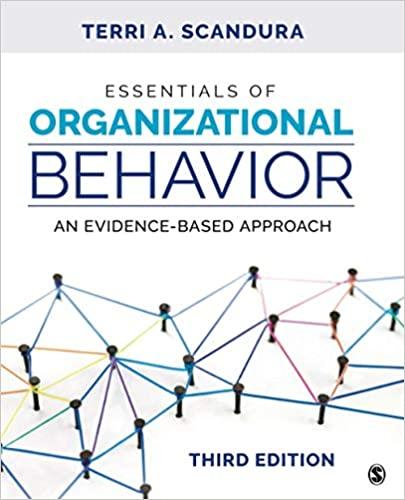Ted is a forensic accountant at the law firm of Chambers, Bergweitz, and Rowe. He has worked
Question:
Ted is a forensic accountant at the law firm of Chambers, Bergweitz, and Rowe. He has worked there for 10 years and is called in on cases when his unique skills are needed by the different attorneys and partners. He reports to Margaret, who has been his boss for 8 years. Margaret is responsible for all the specialized personnel used on cases, not just the forensic accountants. She has been a decent boss—fair, with clear standards for performance and what it takes to get promotions, raises, and bonuses. However, Margaret suffered a medical scare last month and is going to be taking early retirement in order to take care of her health. As a result, the specialists under Margaret are now being divided among the different department heads they serve until a replacement can be hired in a few months (as Margaret is on medical leave, she can’t be replaced in her position for legal reasons at this time). Ted now reports to Richard, the head of the divorce department, and finds him a difficult boss to work for on most days. He always seems to start his day in a bad mood, denying any subordinates’ requests or finding that the requests (as well as requestor) are inconsiderate if he is approached before 11 a.m. Whereas Margaret had a clear process for assigning cases to the accountants, Richard seems to let his moods guide his choices. For instance, when Seeru, another forensic accountant, was late getting Richard a report because she had to get an emergency dental crown repair, Richard was angry with her. He seemingly retaliated by assigning three lastminute cases to her in 1 week and left Ted with nothing to do. He also required Seeru to complete her analysis of all the cases by Monday, thus requiring her to work the weekend. However, when Ted and Seeru’s work helped a client get a large divorce settlement, and thus the firm a large cut of the settlement, he was pleased and gave both of them Friday off on a whim so they could enjoy a long weekend. In addition, Ted has found him yelling on the phone in his office on more than one occasion when he has gone to get files or clarification on cases from him. To make matters worse, Richard often belittles his assistant and other employees outside of his office, which disturbs those in nearby offices and cubicles. Richard’s emotionally charged behaviors are very disruptive to Ted and Seeru’s work. It is hard for them to concentrate when he is yelling, and they do not feel comfortable working in their cubicles because they never know when he is going to have an outburst that makes it impossible to have a phone conversation or to have clients, clients’ financial managers, or other attorneys over for meetings. They also cannot get information they need from him when he is in a bad mood, as they don’t dare go near him...............
Discussion Questions
1. What other strategies might you employ in dealing with Richard or your own moody boss? Are there any actions or behaviors you should avoid?
2. What can Ted and Seeru do to help themselves not catch their boss’s negative emotions and moods, and cope with the emotional stress and turmoil working for Richard causes?
3. Why do you think working for Richard is so emotionally stressful?
4. Think about the legal and ethical ramifications of the behavior of bosses like Richard. Organizations in the United States have the legal obligation to provide safe workplaces, including ones that are safe from harassment. What would you do if you were Richard’s boss or another leader in the organization, and why do you think he was even hired for this position?
Step by Step Answer:

Essentials Of Organizational Behavior An Evidence-Based Approach
ISBN: 9781544396781
3rd Edition
Authors: Terri A. Scandura





